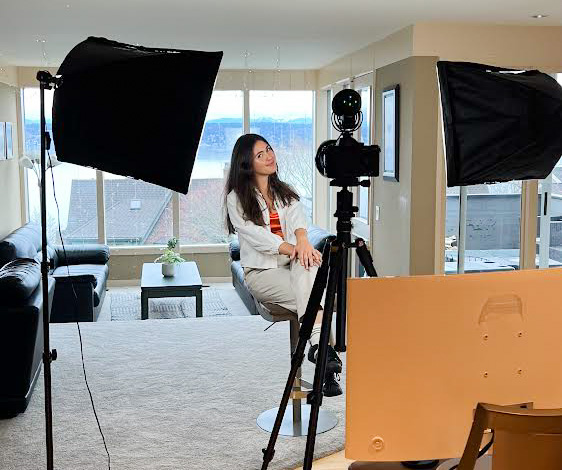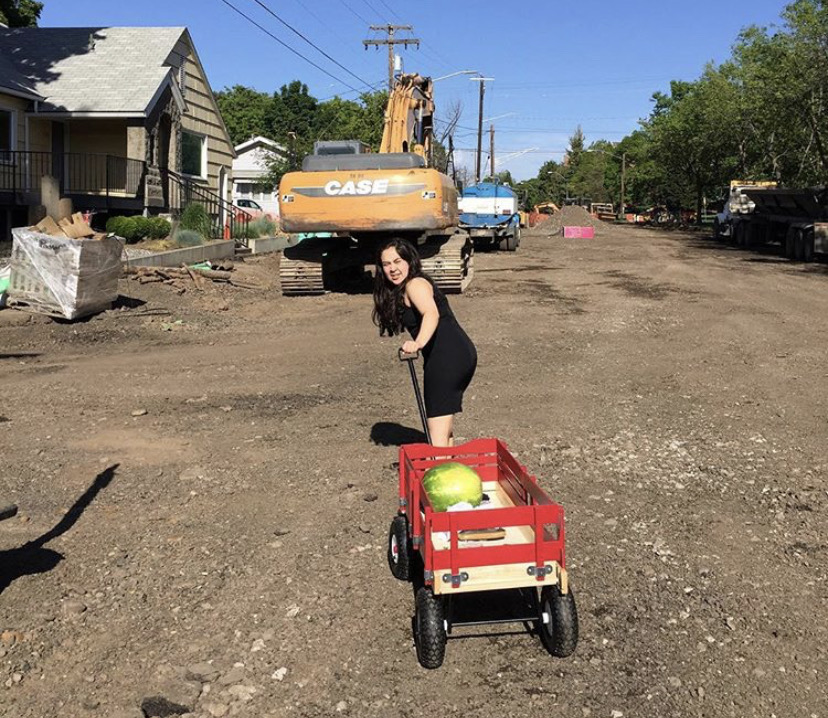As my graduation looms closer, my parents make plans to celebrate the conclusion of my college career and acquaintances ask me what’s next, panic grows. I thought that I would have narrowed down my options by the time I wrapped up my senior year, but I still find myself juggling countless possibilities for my post-grad life.
Desperate for a source of clarity and advice, I decided to reach out to alumni who graduated from Whitman in the past five years or so and hear their stories. Right off the bat, several alumni responded to my email, excited to connect with a current Whitman student and share their thoughts.

I started by asking interviewees about their Whitman experience. Brahm Coler ’19, now an internal medicine resident physician, reflected fondly on his time at Whitman.
“My Whitman experience, when I look back on it, was ultimately defined both by how exceptional the pre-med education was, and also how exceptional my experience outside of the premedical coursework was in terms of actually preparing me for my future,” Coler said.
He emphasized the well-rounded nature of Whitman and how his undergrad experience allowed him to gain a strong education, learn from engaged professors and build a community of friends.
“I fondly remember how challenging it was to get from your dorm or your off-campus housing to class without running into at least a couple people wherever you went,” Coler said.
Many other interviewees also enjoyed their time at Whitman. Kylin Brown ’20 is currently working as a project strategist at Pyramid Communications. She spoke about the wide range of activities in which students could participate at Whitman, as well as the connections she forged. She attributes her friendships to extracurriculars.

“I was super involved on campus besides being at school there, so I think that’s part of why I found a really strong community at Whitman and continue to hang out with them today,” Brown said.
Even when the Whitman experience was positive, alumni reported varying degrees of comfort with the transition out of college as they grappled with the impending conclusion of four years of school.
Coler’s final semester began steeped in uncertainty, but when he received an acceptance letter for medical school, his path grew clear, allowing him to relax and appreciate his final months on campus.
“I had the privilege of getting to spend the rest of that semester very nostalgic and enjoying the last few months there with the community that I had,” Coler said.
For Isaiah Banta ’20, a community organizer, COVID-19 made his last semester at Whitman even more unique and uncertain.

“My whole mental capacity to do work and take it seriously with what felt like the world falling apart and wiping down groceries with Clorox wipes was crazy, but I felt very supported by a solid friend group that I had there,” Banta said.
Focusing on school was difficult when the world turned upside down, but the pandemic also allowed Banta to reflect deeply on his goals.
“The pandemic offered this opportunity for reflection about what was really important and where I’d really gotten a lot of my value out of college, and I realized that it was the relationships and friendships that I’d made and the work that I’d done being in a community and helping build it and be a part of it. And I was like, damn, I don’t think I’m going to be happy just helping a company’s bottom line, if that’s the ultimate goal of what I’m doing,” Banta said.
Banta took advantage of his final semester to reflect and pivot, deciding to stay at Whitman as a Resident Director for a year before diving into community organizing.
Childhood Injury and Violence Prevention Public Health Educator Daphne Gallegos, MPH, explained how she had a short-term plan as she prepared to graduate in 2019, but her long-term plan was still fuzzy. She knew she wanted to go to grad school for public health after Whitman, but wanted to take a year off in between and teach English in France.
“Whitman was intense and I also knew that I needed a break to be able to go on, and it was really helpful to have conversations with professors and mentors on campus,” Gallegos said.
Conversations with her support network on campus helped her gain a sense of her first steps after graduation. Her plan allowed her to reset before returning to the United States to pursue her Masters.
Upon reflection, interviewees felt positive about how Whitman prepared them for their careers and independent life.
Coler approached this question through the lens of a medical student and reported that he, along with his other Whitman friends who went into medical school, felt that Whitman prepared them well for their future studies. He specifically cited the intensity of Whitman’s academics as an important factor in preparing him for graduate studies. This allowed the transition into medical school to feel seamless, almost like a continuation of Coler’s Whitman experience.
Banta also felt that Whitman prepared him, although he emphasized that he doesn’t think that this would have been the case if he had not been involved in a wide array of activities at Whitman. Each aspect of his campus involvement equipped him with different skills. His academic classes taught him discipline, being on ASWC taught him about working with money and politics while Residence life taught him how to build a fun community. Each experience complemented the others and made him more well-rounded.
While Brown agreed that many aspects of Whitman prepared her, specifically mentioning the strong network it provides, she said that she wished she could have had more clarity on the transition into the working world.
“I think Whitman didn’t prepare me in the sense that I graduated with a degree, and the translation for that reaching industries was never given to me,” Brown said.
She ended up reaching out to alumni after graduating, who gave her valuable advice in this regard that helped Brown fill the gap.
“I talked to an alum somewhere along the way who said, ‘After sociology or any humanities degree, you might be certain to be in one of the following fields: communications, research or policy,’ and I think education added in there,” Brown said. Gaining an understanding of broader industries guided her in her career decisions, leading her to communications.
Now, Brown develops campaign materials and messaging for local environmental movements, such as the Save the Snake River campaign. Working with lawyers at EarthJustice has opened her eyes to a future goal: law school.
“Getting to see those lawyers at work has really motivated me and made me realize that that sounds a lot more fulfilling,” Brown said.
Having completed the LSAT, Brown is on track to completing her goals. However, her post-graduate plans were not always so clear.
Not only did she graduate in the beginning of the pandemic, but she also received a medical diagnosis at the end of her first year post-grad.
“At the end of that year I was planning to start job searching … and I got diagnosed with multiple sclerosis (MS), so that’s a debilitating autoimmune disease that affects your brain and spinal cord. It’s a lifelong diagnosis, a life-changing diagnosis,” Brown said.
Following this news, Brown took seven months off from work to travel and reckon with her interests. After this hiatus, she stepped into her current position, while also diving into MS activism and lobbying, which has also been a key contributor to her desires to make an impact.
Banta also spoke about the uncertainty that comes with finding a path after graduation, especially in regards to moving to a place he had never been. He currently works in Texas as a community organizer, and the initial plunge into a new location was jarring.
“Oh my God, it was terrifying,” Banta said. “I literally showed up the night before my first day of work. It was hot as hell because it was in September … but [I] also fell in love with it almost immediately.”
Similarly, Coler acknowledged that the transition from Whitman can be difficult and unclear at first.
“You lose that lovely structure of undergrad and go out into a world that in many ways expects you to be more independent and self-reliant,” Coler said.
However, he reported seeing his Whitman friends thriving in a wide range of careers; it can just take time to get your footing.
As a soon-to-be graduate, I found these stories slightly nerve-wracking, but mostly comforting. To conclude my interviews and gain further clarity on how to approach big transitions like graduation, I asked for any advice that the alumni had, either for life at Whitman, or life post-Whitman.
In regards to Whitman, Coler emphasized trying new things and getting involved.
“The principle of saying yes to things and keeping an open mind to the opportunities that you might not otherwise think you’re interested in was very helpful for me as a first-year, and I would highly encourage other people to take that approach and perspective when they come to Whitman,” Coler said.
For those who are thinking about careers and getting ready to graduate, a common thread of advice was networking.
“There are a lot of people – a lot of Whitman students out there and Whitman alumni – who want to help,” Banta said.
He acknowledged that networking can sometimes feel bad, as if we are taking advantage of others. While this can be true if you do it in a certain way, he emphasized treating networking connections as a bidirectional relationship, where both parties are aiding the other.
“My encouragement to other students would be: you’re doing this for them, too. Alumni want to get reached out to and they want to have people ask them questions about how they got into their career,” Banta said.
Brown agreed with the networking advice, and also spoke about being open to change and unpredictability.
“In these first five years [after graduation], there’s a lot of life that’s going to happen, like my story, but also everyone I know has … I have a theater major friend who left to Chicago and became a birth doula, and she’s still going to do shows on the side. But there’s so many directions that you can go and all of them are valid,” Brown said.
Gallegos seconded this advice.
“Don’t be afraid to change your mind,” she said. “Whitman helped give myself that permission to stray away from what my plan had been since high school. You’re a different person than when you started at Whitman. Listen to what you’re into right now, and embrace the flexibility of being a graduate.”
No matter how much you plan out your future, you never know where you’ll end up. Staying flexible is key. It’s also important to remember that everyone takes on different roles following graduation. This may look like diving straight into medical school, taking a year off before grad school to live in another country, sticking around in Walla Walla and gaining professional experience or testing out several jobs before formulating a larger plan.
While it’s easy to get stuck into games of comparison or should statements, the consensus from these interviews is that it’s okay to bounce around and it’s okay to struggle at first with the transition. Remembering the connections we have, whether it be friends or even the alumni network, can help us know we’re not alone and find new community and opportunity.






